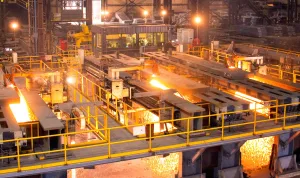Exploring Cutting-Edge Technological Advancements in the Steel Market

In the realm of industrial innovation, few sectors have seen as remarkable a transformation as the steel industry. From traditional smelting techniques to the advent of high-tech processes, the steel market has undergone a profound evolution driven by technological advancements. In this article, we delve into the latest innovations reshaping the landscape of steel production, exploring their implications and potential for the future.
- Smart Manufacturing and Automation: At the forefront of the steel industry’s technological revolution is the implementation of smart manufacturing and automation. Through the integration of artificial intelligence, machine learning, and robotics, steel mills are optimizing production processes, enhancing efficiency, and reducing operational costs. Automated systems monitor and adjust parameters in real-time, ensuring precision and consistency in steel production.
- Advanced Materials and Alloys: Breakthroughs in metallurgy have led to the development of advanced materials and alloys with superior strength, durability, and performance characteristics. Nanotechnology-enabled coatings enhance corrosion resistance, while alloy compositions tailored for specific applications unlock new possibilities in construction, automotive manufacturing, aerospace, and beyond. These innovative materials are driving demand for high-performance steel products in diverse industries.
- Green Technologies and Sustainability: As environmental concerns become increasingly pressing, the steel industry is embracing green technologies to reduce its carbon footprint and minimize environmental impact. Innovations such as electric arc furnaces powered by renewable energy sources, carbon capture and utilization technologies, and sustainable steelmaking processes are revolutionizing the way steel is produced. By prioritizing sustainability, steel manufacturers are not only meeting regulatory requirements but also fulfilling the growing demand for eco-friendly products.
- Digital Twinning and Predictive Maintenance: The adoption of digital twin technology is revolutionizing maintenance practices in the steel industry. By creating virtual replicas of physical assets, steel plants can simulate operational scenarios, optimize equipment performance, and predict maintenance needs with unprecedented accuracy. Real-time monitoring and predictive analytics enable proactive maintenance strategies, minimizing downtime, and maximizing productivity.
- Internet of Things (IoT) and Data Analytics: The proliferation of IoT sensors throughout steel manufacturing facilities enables the collection of vast amounts of data on equipment performance, process variables, and product quality. Through advanced data analytics and machine learning algorithms, manufacturers can gain valuable insights into production processes, identify optimization opportunities, and enhance product quality and consistency. Predictive analytics also play a crucial role in demand forecasting, inventory management, and supply chain optimization.
- Additive Manufacturing (3D Printing): Additive manufacturing, commonly known as 3D printing, is revolutionizing the production of complex steel components with intricate geometries. By selectively depositing layers of metal powder, 3D printing enables the rapid prototyping and production of customized parts with minimal material waste. This disruptive technology is unlocking new possibilities in design flexibility, product customization, and supply chain efficiency across various industries.
- Industry 4.0 and Supply Chain Integration: Industry 4.0 technologies, including interconnected systems, cloud computing, and cyber-physical systems, are driving the integration and optimization of the steel supply chain. Real-time data sharing, predictive analytics, and blockchain-enabled traceability enhance transparency, efficiency, and collaboration among stakeholders, from raw material suppliers to end-users. This interconnected ecosystem enables agile responses to market fluctuations, demand volatility, and supply chain disruptions.
In conclusion, the steel market is undergoing a period of unprecedented technological advancement, fueled by innovations in smart manufacturing, advanced materials, sustainability, digitalization, and supply chain integration. As steel manufacturers embrace these transformative technologies, they are poised to deliver higher-quality products, improve operational efficiency, and drive sustainable growth in an ever-evolving global market landscape. Embracing these innovations will not only secure a competitive edge but also contribute to a more sustainable and resilient future for the steel industry and the broader economy.



